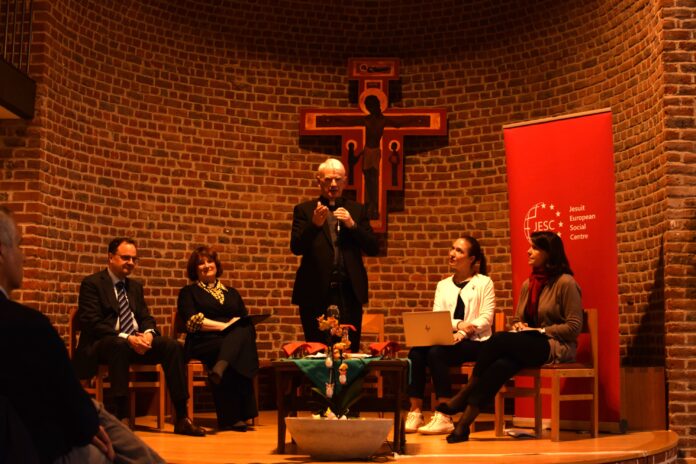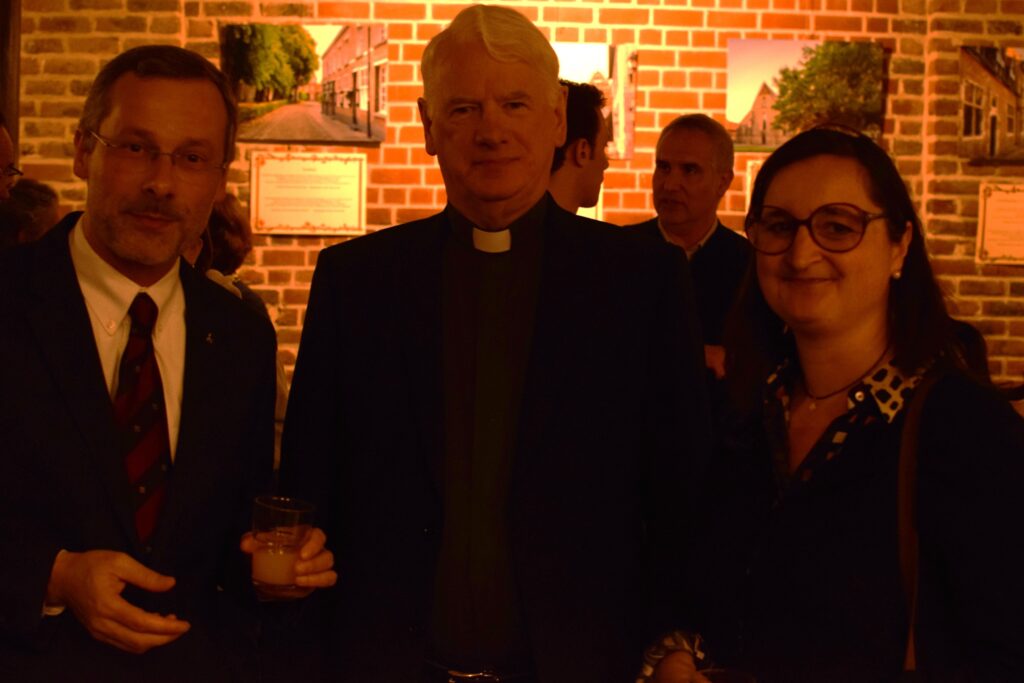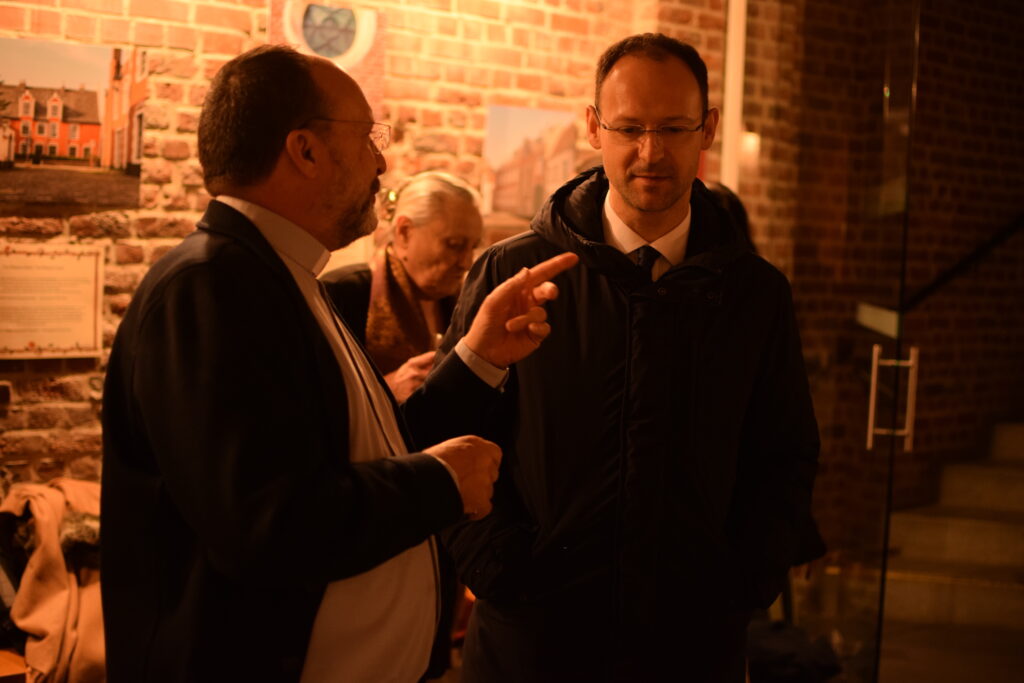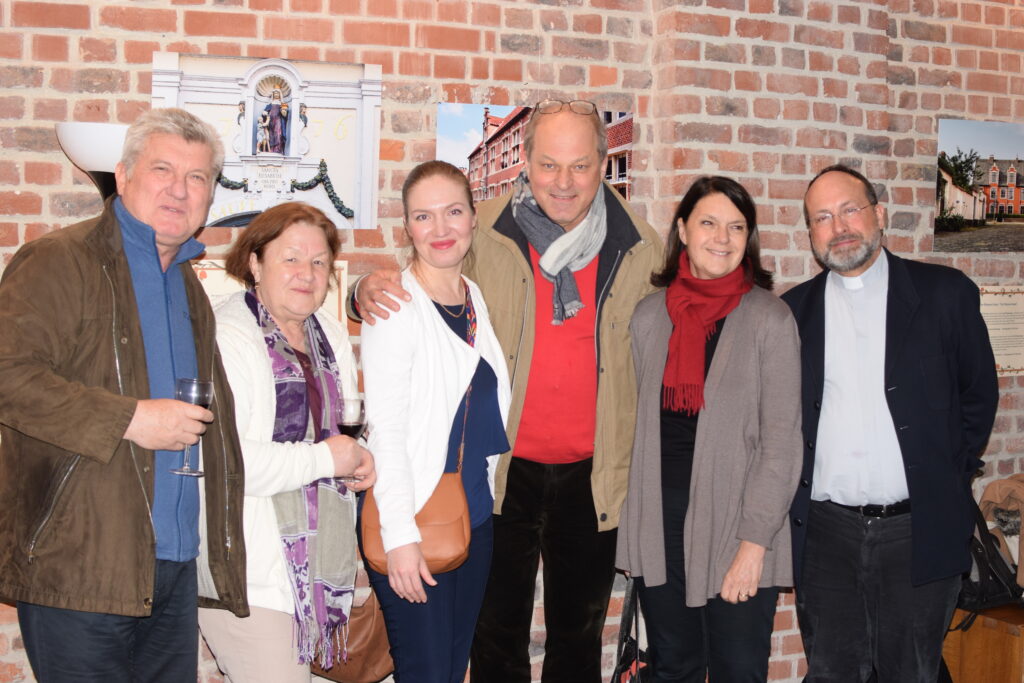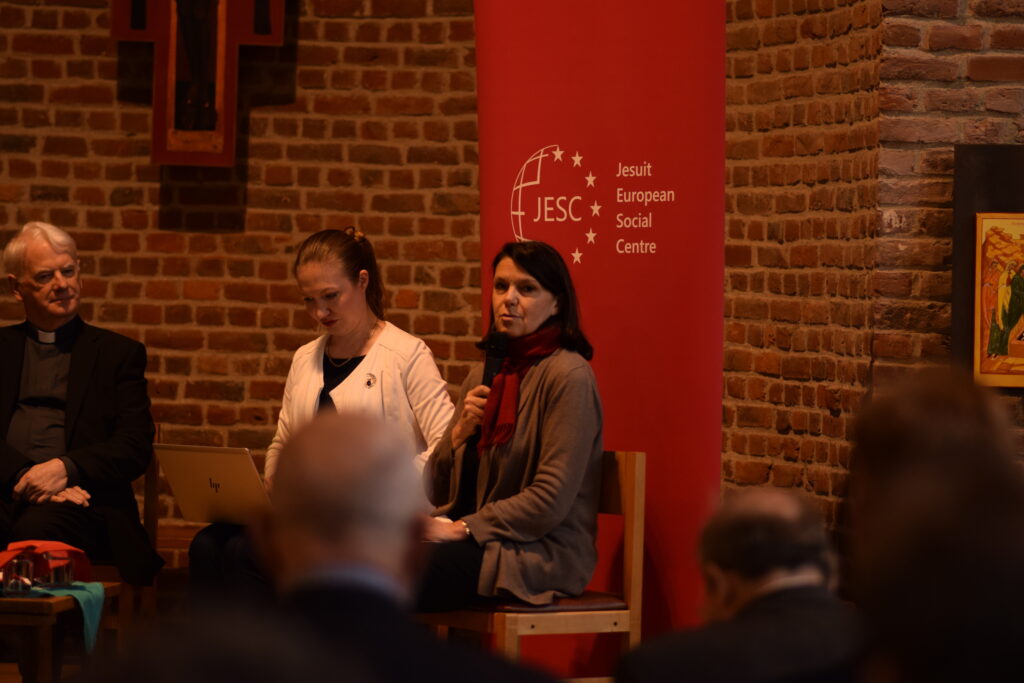On 17 April evening, JESC and the Group Passion for Europe organized a conference titled “What Hope for Europe? Rethinking the Christian Contribution.” About sixty attendants witnessed a very inspiring conference in the Chapel of the Resurrection and seventy attendants joined online. JESC Director, Filipe Martins, opened the meeting by underlining the importance of the conference’s theme and thanked the organizers for this timely event. Moderator Marie de la Saint Cheron, Secretary of Passion for Europe, successively introduced the distinguished speakers before their speeches, after pointing out the importance of hope for Christians challenged by the many crises facing Europe at this juncture.
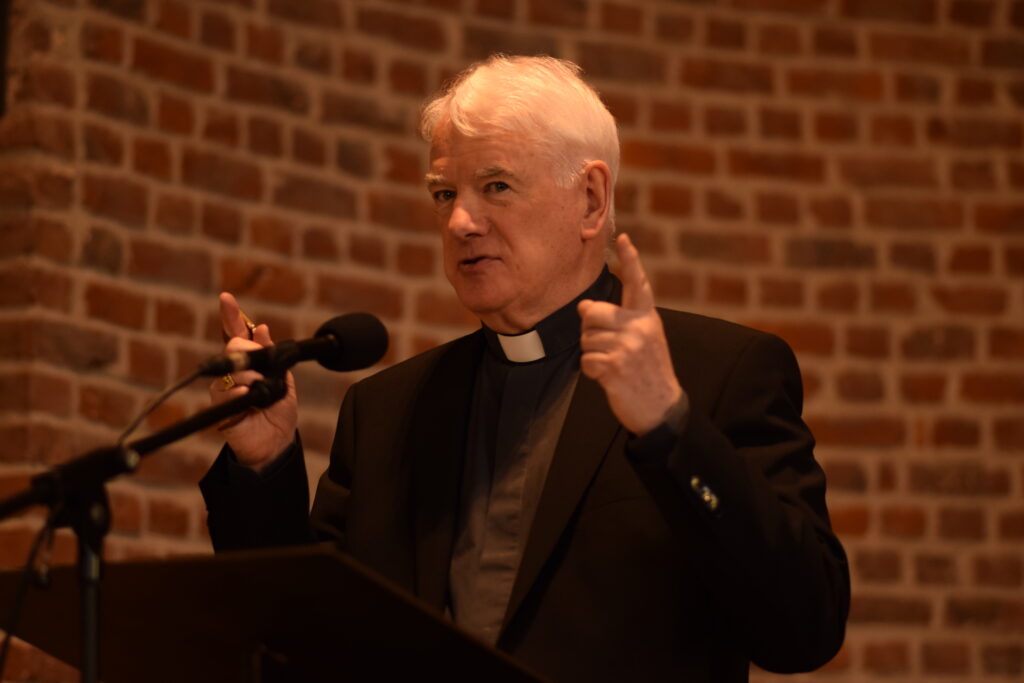 The first speaker, Mgr. Noel Treanor, the new apostolic nuncio of the Vatican to the European Union, expressed his joy to be in the Chapel for Europe, a catholic church with an ecumenical vocation that was rebuilt in 2001. The original chapel, situated in the city center, dates back to 1455. For a better understanding of this conference’s theme, he referred to three authors: Pope Francis, more particularly his letter from 22 October 2020 at the occasion of 50 years of diplomatic relations of the Vatican with the EU and 40 years of the European Catholic Conference of Bishops COMECE; the diplomat, political philosopher and historian Alexis de Tocqueville (1805-1859) well-known for his book on Democracy in America as well as being a priest; and philosopher and theologian Tomas Halik, who wrote many books such as Touch the Wounds: On Suffering, Trust, and Transformation (2023) discussing the Christian contribution to the transformation of the world. Regarding the Christian contribution to the European project, he pointed to the example of the untapped potential of EU dialogue with the churches under article 17 TFEU.
The first speaker, Mgr. Noel Treanor, the new apostolic nuncio of the Vatican to the European Union, expressed his joy to be in the Chapel for Europe, a catholic church with an ecumenical vocation that was rebuilt in 2001. The original chapel, situated in the city center, dates back to 1455. For a better understanding of this conference’s theme, he referred to three authors: Pope Francis, more particularly his letter from 22 October 2020 at the occasion of 50 years of diplomatic relations of the Vatican with the EU and 40 years of the European Catholic Conference of Bishops COMECE; the diplomat, political philosopher and historian Alexis de Tocqueville (1805-1859) well-known for his book on Democracy in America as well as being a priest; and philosopher and theologian Tomas Halik, who wrote many books such as Touch the Wounds: On Suffering, Trust, and Transformation (2023) discussing the Christian contribution to the transformation of the world. Regarding the Christian contribution to the European project, he pointed to the example of the untapped potential of EU dialogue with the churches under article 17 TFEU.
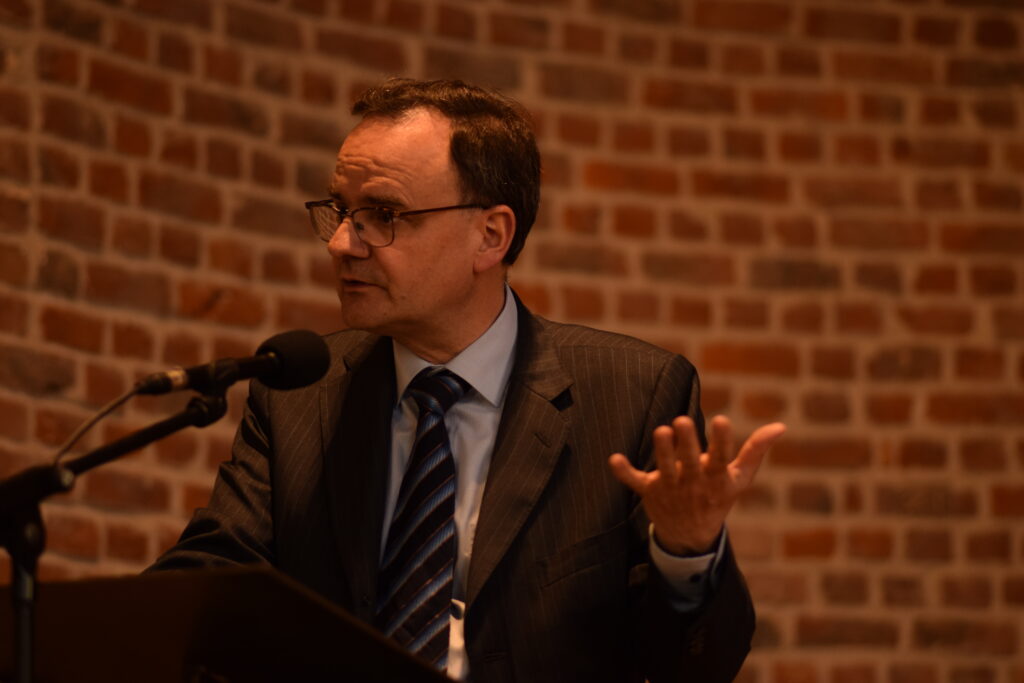 Clemens Ladenburger, the deputy director-general of the Legal Service of the European Commission, told the audience that he learned a lot about the Christian contribution to the European Project when he was the secretary of the European Convention at the beginning of this century. According to him, we need builders of bridges between East and West. The Catholic Church can bring hope by bringing people together. The European Commission Vice-President, Timmermans, expressed his concern that fighting climate change may be distracted by cultural wars. This must be avoided. It is important that different churches agree on a joint message of hope. The membership of Ukraine will be an ecumenical impulse.
Clemens Ladenburger, the deputy director-general of the Legal Service of the European Commission, told the audience that he learned a lot about the Christian contribution to the European Project when he was the secretary of the European Convention at the beginning of this century. According to him, we need builders of bridges between East and West. The Catholic Church can bring hope by bringing people together. The European Commission Vice-President, Timmermans, expressed his concern that fighting climate change may be distracted by cultural wars. This must be avoided. It is important that different churches agree on a joint message of hope. The membership of Ukraine will be an ecumenical impulse.
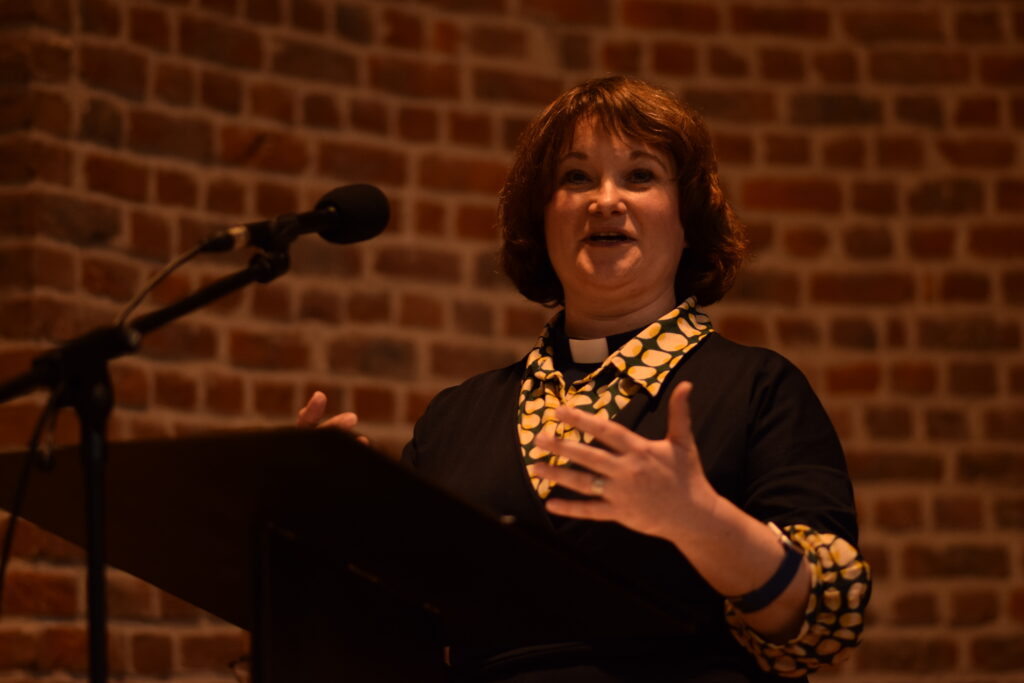 Rev. Sarah-Jane King, Anglican priest and European Commission official, presented four themes: Time, justice, hope, and faith. We must make the best use of time and be aware of our role in God’s story. We have to inhabit time instead of using time. We have to rediscover the way to justice as meant by Jesus and in the Bible. We, as Europeans, have a past of colonialism and must now deviate from neutrality and provide added value regarding justice. We must study the eschatology of the Christian religions. We have work to do to invite other people to our faith and show that God loves everyone of us. She impressed the audience with a common prayer that called to invite one person to join our faith.
Rev. Sarah-Jane King, Anglican priest and European Commission official, presented four themes: Time, justice, hope, and faith. We must make the best use of time and be aware of our role in God’s story. We have to inhabit time instead of using time. We have to rediscover the way to justice as meant by Jesus and in the Bible. We, as Europeans, have a past of colonialism and must now deviate from neutrality and provide added value regarding justice. We must study the eschatology of the Christian religions. We have work to do to invite other people to our faith and show that God loves everyone of us. She impressed the audience with a common prayer that called to invite one person to join our faith.
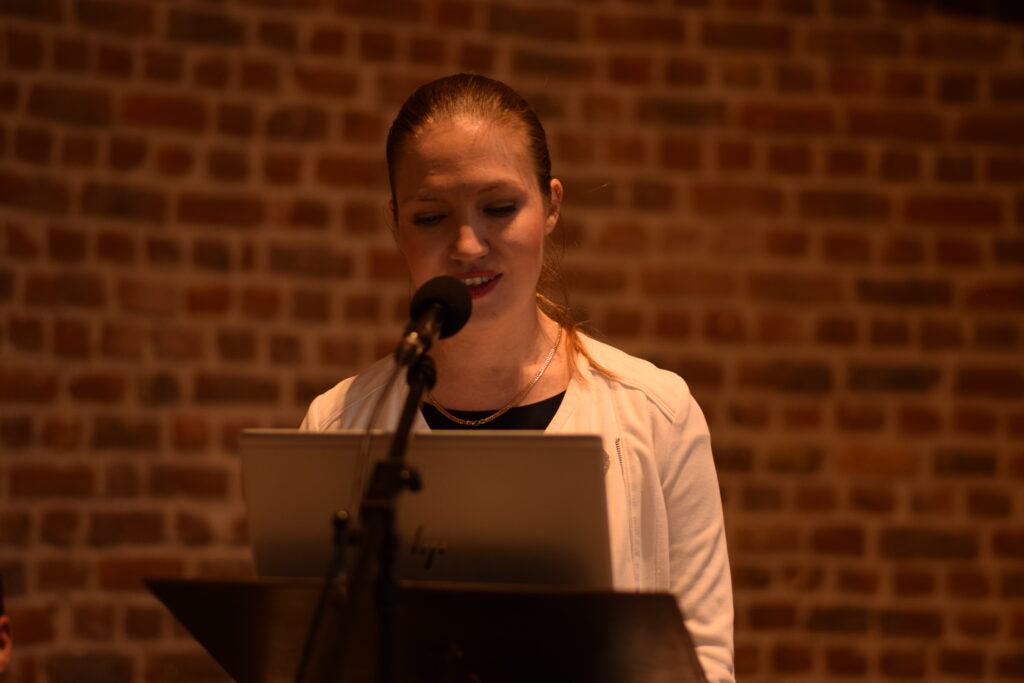 Victoria Vdovychenko, a Ukrainian associate professor of political sciences and fellow at Aston University, as well as a refugee in Belgium since the beginning of the war in Ukraine, impressed the audience by illustrating the hope that Ukrainians have for Europe despite their circumstances, especially in these days of Orthodox Easter. In order to have hope, we must overcome fear. People must make their choice for good instead of evil. We have to rediscover the message of love. Ukrainian churches are united in God’s love. As the Ukrainians say, ”freedom is our religion.” Freedom is the chance to do good. Ukraine will shake Europe after this ongoing war. Ukraine is on the right path to Europe i.e. fighting corruption.
Victoria Vdovychenko, a Ukrainian associate professor of political sciences and fellow at Aston University, as well as a refugee in Belgium since the beginning of the war in Ukraine, impressed the audience by illustrating the hope that Ukrainians have for Europe despite their circumstances, especially in these days of Orthodox Easter. In order to have hope, we must overcome fear. People must make their choice for good instead of evil. We have to rediscover the message of love. Ukrainian churches are united in God’s love. As the Ukrainians say, ”freedom is our religion.” Freedom is the chance to do good. Ukraine will shake Europe after this ongoing war. Ukraine is on the right path to Europe i.e. fighting corruption.
After the speeches, a lively dialogue with the audience took place. On the question with what actions we have to start to offer hope for Europe and how to rethink the Christian contribution to a hopeful future for Europe, each panelist presented an encouraging answer that gave much food for thought.
Overall, it was clear that the meeting had inspired the attendants and showed paths for hope. Mgr Treanor closed the fruitful meeting with a prayer for all of us to be a beacon of hope in Jesus which the apostles spoke about: “Do not live as people that have no hope! ” (1 Thessalonians 4:13).

